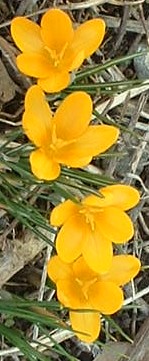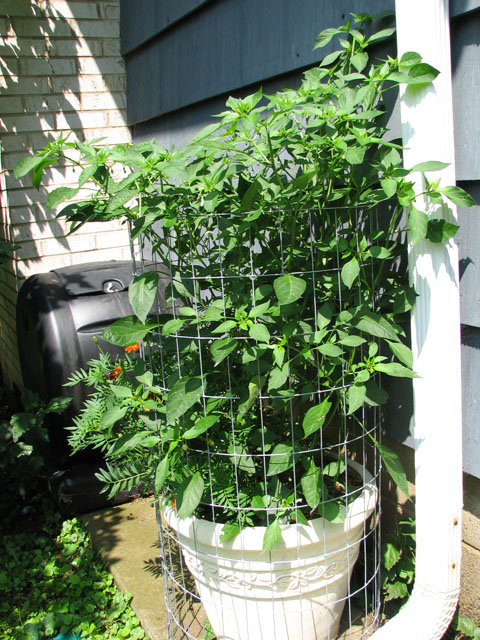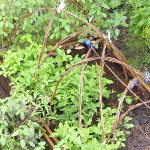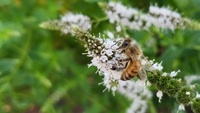Search
Latest topics
» Happy Birthday!!by sanderson Today at 1:15 pm
» What Have You Picked From Your Garden Today
by cyclonegardener Today at 8:56 am
» Zucchini Cobbler
by sanderson Yesterday at 11:38 pm
» Vertical Zucchini
by sanderson Yesterday at 11:34 pm
» What are you eating from your garden today?
by OhioGardener 7/23/2024, 8:25 am
» N&C Midwest—July 2024
by Scorpio Rising 7/22/2024, 1:33 pm
» Starbucks for coffee grounds!
by OhioGardener 7/20/2024, 11:02 am
» Cover Crops to Kill Nematodes
by dstack 7/18/2024, 5:43 pm
» Hi from Lapeer Michigan
by Scorpio Rising 7/18/2024, 10:49 am
» Mel's Mix
by OhioGardener 7/16/2024, 1:40 pm
» Baker Creek Heirloom Whole Seed Catalog Pre-Order
by OhioGardener 7/11/2024, 4:00 pm
» Senseless Banter...
by OhioGardener 7/11/2024, 1:01 pm
» Mark's first SFG
by sanderson 7/9/2024, 2:23 pm
» Wasabi Radish
by markqz 7/8/2024, 10:14 pm
» Check out your local (seed) library !
by OhioGardener 7/8/2024, 11:45 am
» YIKES! I'm hosting uninvited guests in my squash...
by tappingmom 7/3/2024, 9:43 am
» Baked Eggplant
by OhioGardener 7/2/2024, 7:45 am
» N&C Midwest—June 2024
by nrstooge 7/1/2024, 7:48 am
» Epic Gardening "Master Class on Square Food Gardening"
by sanderson 6/26/2024, 10:03 pm
» Growing Tomatoes in 6" of soil?
by sanderson 6/25/2024, 4:21 pm
» Frequency/amount to water
by OhioGardener 6/22/2024, 5:34 pm
» Rhubarb Tom Collins
by DonP 6/19/2024, 2:10 pm
» Change email address
by sanderson 6/19/2024, 2:00 am
» Howdy from San Diego, CA
by sanderson 6/19/2024, 12:49 am
» Getting Started
by Turan 6/18/2024, 12:58 pm
» Turan's Garden Western Mountains and Plains
by Scorpio Rising 6/18/2024, 11:49 am
» Question about replenishing squares after harvest
by SMEDLEY BUTLER 6/17/2024, 12:14 am
» My NWA garden
by Guinevere 6/13/2024, 11:13 am
» creating grids
by plantoid 6/13/2024, 6:42 am
» SFG jOURNEY-What's Hiding in your organic fertilizer
by has55 6/13/2024, 12:40 am
Google
Biochar?
+21
ronbart
Dan in Ct
plantoid
OhioGardener
Kelejan
AtlantaMarie
No_Such_Reality
sanderson
SQWIB
BeetlesPerSqFt
countrynaturals
southern gardener
Yardslave
Pollinator
Turan
Marc Iverson
floyd1440
jimmy cee
camprn
landarch
sfg4uKim
25 posters
Page 1 of 5
Page 1 of 5 • 1, 2, 3, 4, 5 
 Biochar?
Biochar?
Has anyone done any research on biochar? I was trying to get opinions about this.
Thanks
BIOCHAR
Here's a summary:
What Is Biochar?
Producing biochar involves slowly heating biomass (wood and other plant materials) in a low-oxygen environment, such as a kiln. This type of charcoal can do a number of things:
The introduction of biochar into soil is not like applying fertilizer; it is the beginning of a process. Most of the benefit is achieved through microbes and fungi. They colonize its massive surface area and integrate into the char and the surrounding soil, dramatically increasing the soil’s ability to nurture plant growth.
Thanks
BIOCHAR
Here's a summary:
What Is Biochar?
Producing biochar involves slowly heating biomass (wood and other plant materials) in a low-oxygen environment, such as a kiln. This type of charcoal can do a number of things:
- Help return much of the depleted carbon to the soil
- Improve overall soil quality
- Raise soil’s water retention ability
- It may also help “filter” toxic chemicals in the soil, much like carbon-based water filtration systems can filter toxins out of your water
The introduction of biochar into soil is not like applying fertilizer; it is the beginning of a process. Most of the benefit is achieved through microbes and fungi. They colonize its massive surface area and integrate into the char and the surrounding soil, dramatically increasing the soil’s ability to nurture plant growth.
I have seen women looking at jewelry ads with a misty eye and one hand resting on the heart, and I only know what they're feeling because that's how I read the seed catalogs in January - Barbara Kingsolver - Animal, Vegetable, Miracle
sfg4u.com
FB: Square Foot Gardening 4 U

FB: Square Foot Gardening 4 U
 Re: Biochar?
Re: Biochar?
I think there are a few back threads about this in the non square foot gardening forum.
43 years a gardener and going strong with SFG.
https://squarefoot.forumotion.com/t3574-the-end-of-july-7-weeks-until-frost
There are certain pursuits which, if not wholly poetic and true, do at least suggest a nobler and finer relation to nature than we know. The keeping of bees, for instance. ~ Henry David Thoreau
https://squarefoot.forumotion.com/t1306-other-gardening-books
 Re: Biochar?
Re: Biochar?
I used Biochar last spring along with a few more componnents.
It was to add to the compost I picked up from our local recycle center.
Since this compost was supposedly only leaves and brush I thought it would need more vittles.
I only added about a quart to my mix, it appears very much like peat moss.
I wont be using it any more since my compost is up and running.
It was to add to the compost I picked up from our local recycle center.
Since this compost was supposedly only leaves and brush I thought it would need more vittles.
I only added about a quart to my mix, it appears very much like peat moss.
I wont be using it any more since my compost is up and running.

jimmy cee
Certified SFG Instructor-
 Posts : 2215
Posts : 2215
Join date : 2013-02-16
Age : 88
Location : Hatfield PA. zone 6b
 Re: Biochar?
Re: Biochar?
a
I read up and this stuff and the first post is a good summary about biochar and bottom line it is carbon heavy. So why not just use high ratio of material to compost. Pine needles have a 500/1 ratio but take years to break down but can be spread up by shreading them to get a higher surface ratio.
Think I will keep composting but always open to new ideas however need to perfect composting.
I read up and this stuff and the first post is a good summary about biochar and bottom line it is carbon heavy. So why not just use high ratio of material to compost. Pine needles have a 500/1 ratio but take years to break down but can be spread up by shreading them to get a higher surface ratio.
Think I will keep composting but always open to new ideas however need to perfect composting.

floyd1440-
 Posts : 815
Posts : 815
Join date : 2011-06-21
Age : 70
Location : Washington, Pa. Zone 6a
 Re: Biochar?
Re: Biochar?
Seems like something that would be especially useful in pots, as the extra watering pots tend to demand flushes away so many nutrients so quickly.

Marc Iverson-
 Posts : 3638
Posts : 3638
Join date : 2013-07-05
Age : 63
Location : SW Oregon
 Re: Biochar?
Re: Biochar?
But in the SFG would not those nutrients be absorbed by the peat moss to some extent?Marc Iverson wrote:Seems like something that would be especially useful in pots, as the extra watering pots tend to demand flushes away so many nutrients so quickly.

floyd1440-
 Posts : 815
Posts : 815
Join date : 2011-06-21
Age : 70
Location : Washington, Pa. Zone 6a
 Re: Biochar?
Re: Biochar?
But in the SFG would not those nutrients be absorbed by the peat moss to some extent?Marc Iverson wrote:Seems like something that would be especially useful in pots, as the extra watering pots tend to demand flushes away so many nutrients so quickly.

floyd1440-
 Posts : 815
Posts : 815
Join date : 2011-06-21
Age : 70
Location : Washington, Pa. Zone 6a
 Re: Biochar?
Re: Biochar?
I searched biochar and it didn't come up. There were a few threads about using charcoal.camprn wrote:I think there are a few back threads about this in the non square foot gardening forum.
I have seen women looking at jewelry ads with a misty eye and one hand resting on the heart, and I only know what they're feeling because that's how I read the seed catalogs in January - Barbara Kingsolver - Animal, Vegetable, Miracle
sfg4u.com
FB: Square Foot Gardening 4 U

FB: Square Foot Gardening 4 U
 Re: Biochar?
Re: Biochar?
Here, Kim, is a thread that got into it a bit
https://squarefoot.forumotion.com/t13583p60-let-s-work-together-to-chart-alternatives-to-vermiculite-and-peat-moss
https://squarefoot.forumotion.com/t13583p60-let-s-work-together-to-chart-alternatives-to-vermiculite-and-peat-moss

Turan-
 Posts : 2624
Posts : 2624
Join date : 2012-03-29
Location : Gallatin Valley, Montana, Intermountain zone 4
 Re: Biochar?
Re: Biochar?
The problem with compost in hot climates is that it (literally) burns up quickly. Furthermore, in wet climates, soil nutrients (fertilizer) leach out of the soil with every heavy rain, wasting the resource, and polluting ground and surface waters.
Biochar is a way to slow the the oxidation and leaching of compost and soil nutrients. This is why it is so significant in the area where ancient humans first discovered it - the Amazon rain forest. If you clearcut forest land there, in two years the land will be just about worthless.
But some areas exist, that still have useful, fertile, deep black soils that were created by pre-Columbian civilizations. This is called "terra preta," or more recently biochar.
We think of the native societies of the rain forest as being "slash and burn" farmers, but that was in post-Columbian society. An earlier, extinct society used the method of "slash and char." Fires were started and burned until the hydrogen was mostly burned off, then the fires were quenched with water, leaving the carbon residue.
I make charcoal myself in a homemade retort, and now have several drums of it ready for our new homestead, which has acid, sandy soil that is not very fertile. I'm hoping that the crushed charcoal will aid in making this nearly sterile soil bloom again, as it has in the garden beds in our current home.
Biochar should not be used alone. It's best if it is "charged" before adding to the soil. One good way to do this is to soak it in urine. It will absorb the nutrients and slow-release them to the plants. If it doesn't already have any nutrients stored, it could rob nutrients from the plants for a time.
Charcoal was not used alone in ancient times either. It was mixed with compostable residues and lots of bones. Also a lot of finely broken pottery shards were incorporated.
Clemson university did some testing at the Florence (SC) Experiment Station and found that the addition of biochar improved soybean yields by around 20%.
On top of all its other benefits, it also sequesters carbon in the soil - and it's practically permanent. So this can be useful in removing some of the excess carbon that's in our atmosphere. It's commonly thought that this is a result of burning fossil fuels, but a lot of it is from the destruction of organic material in our soils.
Biochar is a way to slow the the oxidation and leaching of compost and soil nutrients. This is why it is so significant in the area where ancient humans first discovered it - the Amazon rain forest. If you clearcut forest land there, in two years the land will be just about worthless.
But some areas exist, that still have useful, fertile, deep black soils that were created by pre-Columbian civilizations. This is called "terra preta," or more recently biochar.
We think of the native societies of the rain forest as being "slash and burn" farmers, but that was in post-Columbian society. An earlier, extinct society used the method of "slash and char." Fires were started and burned until the hydrogen was mostly burned off, then the fires were quenched with water, leaving the carbon residue.
I make charcoal myself in a homemade retort, and now have several drums of it ready for our new homestead, which has acid, sandy soil that is not very fertile. I'm hoping that the crushed charcoal will aid in making this nearly sterile soil bloom again, as it has in the garden beds in our current home.
Biochar should not be used alone. It's best if it is "charged" before adding to the soil. One good way to do this is to soak it in urine. It will absorb the nutrients and slow-release them to the plants. If it doesn't already have any nutrients stored, it could rob nutrients from the plants for a time.
Charcoal was not used alone in ancient times either. It was mixed with compostable residues and lots of bones. Also a lot of finely broken pottery shards were incorporated.
Clemson university did some testing at the Florence (SC) Experiment Station and found that the addition of biochar improved soybean yields by around 20%.
On top of all its other benefits, it also sequesters carbon in the soil - and it's practically permanent. So this can be useful in removing some of the excess carbon that's in our atmosphere. It's commonly thought that this is a result of burning fossil fuels, but a lot of it is from the destruction of organic material in our soils.
 Re: Biochar?
Re: Biochar?
Yes, and the vermiculite too. A raised SFG bed has a lot more durability in its nutrient profile than a pot would -- even a pot with Mel's Mix in it. Pots get hot so quickly and dry out so quickly that they need a lot more water than a raised bed does, and a lot more water means a lot more flushing away nutrients. I think Mel himself even remarks that pots can become almost sterile.floyd1440 wrote:But in the SFG would not those nutrients be absorbed by the peat moss to some extent?Marc Iverson wrote:Seems like something that would be especially useful in pots, as the extra watering pots tend to demand flushes away so many nutrients so quickly.
It's the same problem, but multiplied, that many areas in the Pacific Northwest have. The high level of rain flushes away so much soil and so many nutrients that the remaining soil can be very poor and not very thick, to boot. At my place in Oregon, the soil is little more than yellowish decomposed granite in most places, with a thin layer of not very rich soil on top. Pretty much all the neighborhood gardeners grow in raised beds to get around that. So do I, plus I use some pots and planters.

Marc Iverson-
 Posts : 3638
Posts : 3638
Join date : 2013-07-05
Age : 63
Location : SW Oregon
 Re: Biochar?
Re: Biochar?
I've done hanging baskets & 8 gallon containers for veggies, and flowers this past season.
Everything came out so good I will continue using MM.
I never over watered, adding enough just to keep the baskets from dripping.
On Wednesday's I added miracle gro, on Saturday's I added fish emulsion.
Just enough in my estimation to keep those little buggers happy, and happy they were..
I realize that wouldn't have happened if I had to leave town for some reason.
nasturtium with MM

Marigold with MM

Cayanetta peppers with MM
This plant grew so many peppers, it was mostly red when I picked them

Everything here was with MM, I am sold on it
Everything came out so good I will continue using MM.
I never over watered, adding enough just to keep the baskets from dripping.
On Wednesday's I added miracle gro, on Saturday's I added fish emulsion.
Just enough in my estimation to keep those little buggers happy, and happy they were..
I realize that wouldn't have happened if I had to leave town for some reason.
nasturtium with MM

Marigold with MM

Cayanetta peppers with MM
This plant grew so many peppers, it was mostly red when I picked them

Everything here was with MM, I am sold on it

jimmy cee
Certified SFG Instructor-
 Posts : 2215
Posts : 2215
Join date : 2013-02-16
Age : 88
Location : Hatfield PA. zone 6b
 Re: Biochar?
Re: Biochar?
I'm a little confused here. Is biochar just the charcoal produced from burned vegitation or is it from burned hardwoods, or both? I burned all the fruit tree cuttings and leftover hardwood (oak) and reduced them to white ashes. I spread these out under my citrus trees and in my strawberry beds and it pretty much shut them down- no new vigorous growth-they looked like they were nitrate deficient. I tested the soil and the Ph. was now too alkaline, and there seems to be too much potash in the soil. I had been warned that this may happen with ash applications, but had to see for myself. I think that biochar has to be largely charcoal rich in carbon, which it is if it isn't reduced to white ash. I'm going to have to add iron now to lower the Ph. I learned my lesson- everything in moderation.

Yardslave-
 Posts : 546
Posts : 546
Join date : 2012-01-19
Age : 73
Location : Carmel Valley, Ca.
 Re: Biochar?
Re: Biochar?
Right, that'sYardslave wrote:I'm a little confused here. Is biochar just the charcoal produced from burned vegitation or is it from burned hardwoods, or both? I burned all the fruit tree cuttings and leftover hardwood (oak) and reduced them to white ashes. I spread these out under my citrus trees and in my strawberry beds and it pretty much shut them down- no new vigorous growth-they looked like they were nitrate deficient. I tested the soil and the Ph. was now too alkaline, and there seems to be too much potash in the soil. I had been warned that this may happen with ash applications, but had to see for myself. I think that biochar has to be largely charcoal rich in carbon, which it is if it isn't reduced to white ash. I'm going to have to add iron now to lower the Ph. I learned my lesson- everything in moderation.
the difference between "slash and burn" and "slash and char." It's very important to stop the burn before you get ashes. Ashes do salvage some minerals and reduce acidity, but you don't want to use them on soils that aren't acid. Biochar is much more near neutral in its effects. I'm not sure it it *can* be overdone, but I shoot for about 5% in my mixes.
You can make charcoal in open fires, by quenching the fire at the right time, but it does produce a lot of polluting gasses. In a retort, these gasses are redirected back into the fire, and mostly burn up. So a retort is a lot cleaner way to make biochar.
 Re: Biochar?
Re: Biochar?
jimmy cee wrote:I've done hanging baskets & 8 gallon containers for veggies, and flowers this past season.
Everything came out so good I will continue using MM.
I never over watered, adding enough just to keep the baskets from dripping.
On Wednesday's I added miracle gro, on Saturday's I added fish emulsion.
Just enough in my estimation to keep those little buggers happy, and happy they were..
I realize that wouldn't have happened if I had to leave town for some reason.
nasturtium with MM
Marigold with MM
JimmyCee...you fed miracle grow every week? Do you think that's why your garden did so well? In addition to the fish emulsion? How did you apply the fish emulsion? I have some, but not sure how to "do it right". I'd rather stay away from the MG if possible. thanks for any help. Sorry if this hijacks the thread...feel free to move if necessary. Thanks!!
Cayanetta peppers with MM
This plant grew so many peppers, it was mostly red when I picked them
Everything here was with MM, I am sold on it

southern gardener- Posts : 1887
Join date : 2011-06-21
Age : 43
Location : california, zone 10a
 Re: Biochar?
Re: Biochar?
I was just thinking about pots after Sanderson mentioned getting the microbes going in my new sfg carrot bed. I have always just plunked new seeds or plants into the old dirt in my containers. DUH! It was probably "dead" store-bought potting soil to start with and now it would be dead, depleted potting soil.Marc Iverson wrote:Seems like something that would be especially useful in pots, as the extra watering pots tend to demand flushes away so many nutrients so quickly.

 Re: Biochar?
Re: Biochar?
Our woodstove is a modern one with a "re-burner" to reduce air pollution. Is that similar to a retort?Pollinator wrote:
You can make charcoal in open fires, by quenching the fire at the right time, but it does produce a lot of polluting gasses. In a retort, these gasses are redirected back into the fire, and mostly burn up. So a retort is a lot cleaner way to make biochar.
 Re: Biochar?
Re: Biochar?
I LOVE THIS THREAD AND THIS FORUM!  Final question: How small should the biochar pieces be to put into the compost to charge?
Final question: How small should the biochar pieces be to put into the compost to charge?
 Final question: How small should the biochar pieces be to put into the compost to charge?
Final question: How small should the biochar pieces be to put into the compost to charge? Re: Biochar?
Re: Biochar?
Correct me if I am wrong, but bio char is like charcoal, not fully burned, not the stuff you get from cleaning your wood stove. The reburner is adding more oxygen to more fully burn the wood, charcoal is done the opposite, it is burned with as low oxygen as possible to only take out some of the volatiles of burning.
I have read that it is best to add ash lightly to a compost pile, it is lye that washes out of it, a little goes a long way. If your pile and soil tend to be alkaline (like mine) it would seem to be more harmful than helpful. I wonder if it would be good to sprinkle around the barn/chicken coop areas.
There is such a huge difference between the East and the West and I got myself into soil trouble listening to some one in a very different climate than mine.
I have read that it is best to add ash lightly to a compost pile, it is lye that washes out of it, a little goes a long way. If your pile and soil tend to be alkaline (like mine) it would seem to be more harmful than helpful. I wonder if it would be good to sprinkle around the barn/chicken coop areas.
There is such a huge difference between the East and the West and I got myself into soil trouble listening to some one in a very different climate than mine.

Turan-
 Posts : 2624
Posts : 2624
Join date : 2012-03-29
Location : Gallatin Valley, Montana, Intermountain zone 4
 Re: Biochar?
Re: Biochar?
^ I came close to making this mistake, too.Turan wrote:Correct me if I am wrong, but bio char is like charcoal, not fully burned, not the stuff you get from cleaning your wood stove. The reburner is adding more oxygen to more fully burn the wood, charcoal is done the opposite, it is burned with as low oxygen as possible to only take out some of the volatiles of burning.
I have read that it is best to add ash lightly to a compost pile, it is lye that washes out of it, a little goes a long way. If your pile and soil tend to be alkaline (like mine) it would seem to be more harmful than helpful. I wonder if it would be good to sprinkle around the barn/chicken coop areas.
There is such a huge difference between the East and the West and I got myself into soil trouble listening to some one in a very different climate than mine.

BeetlesPerSqFt-
 Posts : 1440
Posts : 1440
Join date : 2016-04-11
Location : Centre Hall, PA Zone 5b/6a LF:5/11-FF:10/10
 Re: Biochar?
Re: Biochar?
It isn't going to be as easy as I thought. We had a little fire this morning and I separated 3 nice little chunks for biochar, but it was burned to ash by the time it cooled. Maybe I need to drop them into water, but I'm not liking that idea -- too messy and too much trouble.Turan wrote:Correct me if I am wrong, but bio char is like charcoal, not fully burned, not the stuff you get from cleaning your wood stove. The reburner is adding more oxygen to more fully burn the wood, charcoal is done the opposite, it is burned with as low oxygen as possible to only take out some of the volatiles of burning.
Our soil is acid, so I dump all of our ashes right into the compost. It's still a very small part of the heap, and only happens for part of the year, so I'm not worried about it.I have read that it is best to add ash lightly to a compost pile, it is lye that washes out of it, a little goes a long way. If your pile and soil tend to be alkaline (like mine) it would seem to be more harmful than helpful. I wonder if it would be good to sprinkle around the barn/chicken coop areas.
Ain't that the truth! Every seed packet I read says "6 hours of direct sun". I don't know of a single crop that could survive 6 hours of direct sun in our brutal summers, but I had to learn that lesson the hard way.There is such a huge difference between the East and the West and I got myself into soil trouble listening to some one in a very different climate than mine.
 Re: Biochar?
Re: Biochar?
Build a fire wait till the wood is burnt up completely, cover with dirt and smoother.countrynaturals wrote:It isn't going to be as easy as I thought. We had a little fire this morning and I separated 3 nice little chunks for biochar, but it was burned to ash by the time it cooled. Maybe I need to drop them into water, but I'm not liking that idea -- too messy and too much trouble.Turan wrote:Correct me if I am wrong, but bio char is like charcoal, not fully burned, not the stuff you get from cleaning your wood stove. The reburner is adding more oxygen to more fully burn the wood, charcoal is done the opposite, it is burned with as low oxygen as possible to only take out some of the volatiles of burning.Gotta do some more research.
 Our soil is acid, so I dump all of our ashes right into the compost. It's still a very small part of the heap, and only happens for part of the year, so I'm not worried about it.I have read that it is best to add ash lightly to a compost pile, it is lye that washes out of it, a little goes a long way. If your pile and soil tend to be alkaline (like mine) it would seem to be more harmful than helpful. I wonder if it would be good to sprinkle around the barn/chicken coop areas.Ain't that the truth! Every seed packet I read says "6 hours of direct sun". I don't know of a single crop that could survive 6 hours of direct sun in our brutal summers, but I had to learn that lesson the hard way.There is such a huge difference between the East and the West and I got myself into soil trouble listening to some one in a very different climate than mine.
Our soil is acid, so I dump all of our ashes right into the compost. It's still a very small part of the heap, and only happens for part of the year, so I'm not worried about it.I have read that it is best to add ash lightly to a compost pile, it is lye that washes out of it, a little goes a long way. If your pile and soil tend to be alkaline (like mine) it would seem to be more harmful than helpful. I wonder if it would be good to sprinkle around the barn/chicken coop areas.Ain't that the truth! Every seed packet I read says "6 hours of direct sun". I don't know of a single crop that could survive 6 hours of direct sun in our brutal summers, but I had to learn that lesson the hard way.There is such a huge difference between the East and the West and I got myself into soil trouble listening to some one in a very different climate than mine.
I used to make it in a retort. 55 gallons then I used 5 gallon.
For retort put chunked wood on 5 gallon Pail, or on lid that has a few ½ holes, toss on the fire, it will smoke then flames will come out of the hole, once the gas has burnt of, remove the bucket and place upside down to choke, open the next day and crush.
Make sure not to use a lid with a gasket.
I now just put out the fire with a garden hose, crush the next day and wash or more with a hose then after a few dry days I'll put in buckets, add urea for a week or two then add too my beds with rabbit manure, or just dump in the compost heap after adding urea of course.

SQWIB- Posts : 366
Join date : 2016-03-07
Location : Philly 7A
 Re: Biochar?
Re: Biochar?
SQWIB wrote:just dump in the compost heap after adding urea of course.
I'm almost afraid to ask, but where does the urea come from?
 Re: Biochar?
Re: Biochar?
Can any one remember the thread we had on collecting urea?
I recall something about a bucket kept in the shower area
I recall something about a bucket kept in the shower area

Turan-
 Posts : 2624
Posts : 2624
Join date : 2012-03-29
Location : Gallatin Valley, Montana, Intermountain zone 4
Page 1 of 5 • 1, 2, 3, 4, 5 
Page 1 of 5
Permissions in this forum:
You cannot reply to topics in this forum|
|
|











